- Home
- Martin Cruz Smith
The Siberian Dilemma
The Siberian Dilemma Read online
Thank you for downloading this Simon & Schuster ebook.
Get a FREE ebook when you join our mailing list. Plus, get updates on new releases, deals, recommended reads, and more from Simon & Schuster. Click below to sign up and see terms and conditions.
CLICK HERE TO SIGN UP
Already a subscriber? Provide your email again so we can register this ebook and send you more of what you like to read. You will continue to receive exclusive offers in your inbox.
FOR EM
FROM BEGINNING TO END
1
Sasha’s eyes were set in a huge pan-shaped head and he studied Arkady as someone who might share his misery. The bear was a towering beast but his customary roar was weakened by alcohol. His mate, Masha, sat on her rump, a half-empty bottle of champagne pressed to her breast. A plaque on the zoo guardrail read “Sasha and Masha, American Brown Bear (Ursus arctos horribilis).” That sounded about right, Arkady thought.
The bears had been released by somebody who had left a poster that declared “We Are Animals Too.” Arkady wasn’t going to dispute this.
At four in the morning the dark made every fairy-tale feature of the park into something grotesque. Statues became monsters. Shadows spread wings. Lions softly growled and polar bears manically paced back and forth.
Arkady was an Investigator of Special Cases, and if a bear running loose in the heart of Moscow was not a special case, he didn’t know what was. Victor, his partner, was an excellent detective when he was sober.
By the time they arrived, the zoo director had tagged Sasha and Masha with tranquilizer darts loaded with barbiturates that, combined with champagne, made a heady cocktail for even an Ursus arctos horribilis.
Masha slumped against a stone wall. Sasha’s every burp was a foul bubble and each snore resonated like a broken drum. One moment he seemed inert, the next he jerked upright and swept the air with a massive paw. A half dozen young zookeepers held poles like lances and cautiously surrounded the bears from a distance.
They were greeted by Victor’s sister, Nina, the zoo director, a take-charge kind of woman dressed in a sheepskin coat and hat. She was toting a tranquilizer gun.
She gave Arkady a firm handshake.
“Did you call for more help?” he asked.
“I don’t want police charging around the grounds,” she said. “That’s why I called you.”
“I am the police,” Victor said.
“Ha!”
So much for Nina’s estimate of her brother.
Sasha and Masha were thirty meters away, lurching toward an ice cream cart. Together they shook it until the handle broke, then rocked it from side to side until it fell over. Discouraged, they lumbered back to their stone wall and collapsed to the ground.
Arkady’s father, General Renko, had hunted bears and warned him about people who thought they could outrun or outclimb them. “In case of an encounter, do not run; a bear is faster,” he said. “If he catches you, play dead.”
Arkady hoped that these young zookeepers had been trained to deal with brown bears. He had the feeling that Sasha could knock them over like tenpins.
“Tell me about last night,” Arkady said.
“We had a fund-raiser for patrons of the zoo in the main hall and there was a good deal of drinking and celebrating. We feed them, offer them champagne, and while they’re in a generous mood, we hold an auction. A cleanup crew put all the empty and half-empty bottles in bins to be picked up in the morning. It appears Sasha and Masha got into them.”
“How did they get out of their cage in the first place?”
“There’s been a lot of agitation by animal activists lately. It looks to me like an idealistic animal lover snuck in after everyone had gone, released the bears, and put up his poster as a protest. It had to be someone that the bears were familiar with.”
A classic inside job, Arkady thought.
“Apparently, one of your keepers has gone soft in the brain,” Victor said.
“And what do you auction at a zoo?” Arkady asked.
“The highest bidders are given the honor of having a baby giraffe named after them, or a private visit with a koala bear. Things of that nature.”
“In other words, it’s a crass display of money,” Victor said.
“We depend on wealthy people in high places to support the zoo.”
Not bad, Arkady thought. Had President Putin himself attended? He was known to like photo ops with lion cubs.
“Tell me about the bears,” he said.
“The female, Masha, is docile enough, but Sasha, the male, can be aggressive.”
“Poor bastards. They’ll probably be hosed down,” Victor said. “At least, that’s what they do to me in the drunk tank. Bears should be rambling through the wilds of Kamchatka in all their glory, scooping salmon out of streams and scaring the wits out of campers. Instead, they’re an embarrassment to nature.”
“Animals don’t suffer from the zoo experience,” Nina said. “Nothing could be further from the truth. Bears live longer in captivity than in the wild. They don’t mind.”
“And if you tickle a lab rat, it will giggle,” Victor said. “Can you kill a bear with that?” Victor nodded at her tranquilizer gun.
“Of course not,” Nina said. “The gun is for the bear’s protection.”
“Does the bear know that?”
“It’s just compressed air and barbiturates.” She pulled a dart with a pink pompom at its end. “We call it ‘chemical immobilization.’ ”
“Masha’s on the move,” a zookeeper called out.
Masha wanted no part of the scene; she stood, sadly turned, and waddled back toward the open door of her caged den. A champagne bottle slipped from her grasp and rolled away. She sighed. The brief excursion had been excitement enough for her.
“She likes her den,” Arkady said.
“It’s called a habitat,” Nina corrected him.
“It’s a fucking circus,” said Victor.
Sasha was brokenhearted by Masha’s betrayal. He got to his feet, moaned, and swung his head from side to side.
“Now what?” Victor asked.
Nina dropped her voice. “It depends on whether Sasha follows Masha or goes to sleep. All we can do is wait.”
“How smart are they?” Arkady asked.
“At a guess, I’d say as intelligent as a three-year-old. That’s a very unscientific estimate.”
“A three-year-old giant with claws,” Victor said.
“On that order.”
“Let’s hope he needs a nap,” Arkady said. “Are bears your specialty?”
“Primatology.” She swept hair from her forehead. “I study apes.”
“Me too,” said Arkady.
“You had pets when you were a boy, didn’t you?” Victor asked.
“Some.” Arkady didn’t have ordinary pets like dogs or cats. He had collected geckos and snakes, whatever he could catch on the Mongolian steppe.
“I understood that you have experience hunting bears,” Nina said.
“Me?”
“Victor told me that you were a regular big-game hunter.”
Arkady turned to Victor. “You said that?”
“Maybe I exaggerated.”
“No, I never shot a bear. Maybe a rabbit.”
“Then I’ve been misinformed, as usual.”
“I’m afraid so.”
Arkady’s father had been posted in a number of godforsaken places in the middle of Siberia. In the wintertime he would enlist a native guide and head into the taiga, with Arkady following their snowshoe tracks. The natives made their living by trapping or shooting sables through the eye, leaving a pelt smooth and intact. General Renko nearly matched the hunter’s marksmanship.
With a rifle, Arkady was lucky to hit a tree.
“So you have never shot or tagged a bear.” Nina’s voice sank.
“No,” Arkady said.
“Maybe we should just shoot him,” Victor said.
“Shooting a bear is the last thing we want,” Nina said. “You have no idea how difficult and expensive it would be to find another bear with a clean bill of health. Besides, Masha might reject a new bear.”
That was always a possibility, Arkady thought.
Sasha’s eyes took on a more focused glint. As he rose to his full height, a rank smell steamed off him. There was a honking and clatter as the surface of the pond rose. Sasha lifted his head and watched ducks and geese rise in formation, then locked eyes on Arkady, took a sly step forward, and extended a paw as if to say, “This way to your table, monsieur.” This was followed by a roar that shook the earth.
The zookeepers lowered their poles like lances and slowly began to move in.
“Stop!” Victor shouted. “Stay where you are!”
The young men tripped over their feet as they backed up.
Nina cocked the tranquilizer gun. She fired but the dart fell short.
She reached for another dart, inserted it into the chamber, and pulled the trigger again. By this time, Sasha was no more than ten meters away from them. Again the dart fell short. A dud. Nina’s hands were shaking. She shoved the gun into Arkady’s hands.
He loaded and fired. A pink plume like an artificial flower appeared in Sasha’s forehead. The bear swatted at it once, twice, and was asleep before he hit the ground.
2
After leaving the zoo, Arkady bought a bouquet of flowers and headed to Yaroslavsky Station to meet Tatiana’s train. The station was a byzantine creation as frightening as a child’s nightmare. It rose up in the middle of Moscow like a goblin, windows for eyes and a dark slanted roof capping a huge entryway ready to devour all who entered.
As the Trans-Siberian Express drew up to the platform, third-class passengers with no time to lose rushed off the train, leaving the pigsties they had made of their cabins. Crumpled wrappers, sausage ends, greasy cheese, spilled beer, and empty bags of potato chips littered the compartments. Oilmen, gamblers, and miners—the sort that never dug grit from under their fingernails—found their wives. Babies howled with discomfort while older children rubbed sleep from their eyes.
Wealthy tourists disembarked from luxury carriages to meet porters who rescued luggage and bags of souvenirs. Tatiana would be riding in the second-class carriage, neither hard nor luxurious but perfectly suited for those doing business in the new Russia.
Hundreds of travelers fanned out across the great hall or ducked into Metro tunnels. Arkady scanned the crowd searching for Tatiana, listening for the decisive tap of her heels on the marble floor. He tripped over Gypsies who were sprawled out on the floor like so many pashas at ease. Babushkas defended sweet-smelling loaves of bread and bottles of homemade pickles from police dogs. Boys handed out fliers advertising local bars, cafés, and strip clubs.
Rather than argue with Arkady about the risks she took, Tatiana often simply left without telling him where she was going. Two months earlier she had disappeared from their apartment, leaving only a railroad timetable on the kitchen table with the route to Moscow from Siberia underlined as if to say, “Catch me if you can.” She had circled November 14 and 13:45 as her return time.
As an investigative journalist, Tatiana was the natural target of thugs: a stab in the leg with a poisoned umbrella or sometimes a shot in the back of the head. She never looked for such dangers. She was fatalistic and, oddly enough, lighthearted. When he was with her, he looked for individuals who might wish her harm, who folded their newspapers too tightly or walked too briskly or too slowly.
Arkady went from tunnel to tunnel, back and forth from racks of fashion magazines to the electronic board of departure and arrival times and back again. There was no Tatiana. He dropped his flowers into a metal basket as he left.
* * *
From the train station, Arkady went straight to the prosecutor’s office, where Prosecutor Zurin was holding forth on a recent trip to Cuba. Four deputies in blue serge and brass buttons drew their chairs close to give Zurin their rapt attention. His white hair was starting to thin and his features starting to pucker with age, but he still enjoyed the sound of his own voice.
“I conveyed to our counterparts in Havana our profound condolences on the death of our Comrade Fidel Castro.”
Arkady remembered Havana Club rum and insinuating music. A dozen years earlier he had investigated the death of a colleague floating in Havana Bay.
Zurin saw his least favorite investigator slipping down the hall.
“Renko, wait—wait, I want to talk to you. Not here. In your office.”
Arkady’s office was as crowded as a crab pot. Desk, chair, cabinet, coatrack, and file cabinets huddled together. The desktops of other investigators displayed photographs of their wives and children like sworn testimonials of virtue. His was bare by comparison.
Zurin shut the door behind him. “I was there, you know—at Fidel’s memorial.”
“I didn’t know that.” Arkady hoped that the prosecutor would notice that there was room for only one person to sit.
Zurin assumed a thoughtful expression. “It reminds us that the Revolution must always be guarded with vigilance. Our statistical success against violent crime should not be taken for granted.”
Russian homicides had a high “solved” rate thanks to a judicial system that relied less on evidence than confession. It was easier to beat a confession out of an innocent drunk than to pry it out of a sober killer. Still, Renko had a knack for solving the most difficult cases without resorting to force.
“The annual review is coming up. What should I say about you?” Zurin asked.
“Tell them I could use a larger office.”
“I was thinking of mentioning your lack of collegial cooperation. Don’t you think collegial cooperation is important, Renko?”
“Absolutely.”
“Then why don’t you show it? Your colleagues say that at times you even reverse their hard work.”
“If the evidence is insubstantial, yes.”
“If a man has confessed, what does evidence matter? I’ve told you a hundred times that the best evidence in the world is a confession. And among colleagues, cooperation. Each man pulling his own oar.” Zurin then took Arkady by surprise. “You’ve been to Cuba?”
“A long time ago.”
“So you obviously speak Spanish.”
“Very poorly.”
“Well, a man of your skills—Spanish, Russian, familiar with the locals, knowledge of the law—would be nicely positioned in the new Cuba. If he had the right attitude.”
“We’ll never know.”
“You’d have to be motivated. I understand that.”
Arkady pictured life under a palm tree, ducking coconuts, plucking the strings of a guitar.
“Too nice. It doesn’t sound like me.”
“Just a thought. There would be suspicions. With you, there is always a cloud of suspicion.” As suddenly as Zurin had gone one direction, he went another. “How do you feel about Siberia?”
“It’s large and it’s cold,” Arkady said.
“I have an assignment for you. Nothing could be simpler. Next week you go to Irkutsk, pick up a would-be murderer named Aba Makhmud, take him to a transit prison where you will prosecute him, and see that he gets a good, long sentence.”
“ ‘A would-be murderer’?”
“He’s a Chechen, a terrorist. He tried to kill a prosecutor.”
“I haven’t heard about this case.”
“It’s fresh.” Zurin slapped a dossier onto Arkady’s desk. “It’s all in here.”
“Which prosecutor?”
“It happens to be me. You are my investigator and I want you to bring about a swift and proper conviction.”
“Why me?”
“Because you’re famous for being difficult. No one would say that you’re the kind of person who allows himself to be influenced or railroaded.”
“What if I decline the case? Or come to the wrong conclusion?”
“You won’t. I’ve finally figured you out, Renko. You think you’re so independent, but you’re a hostage to fate like the rest of us.”
“Meaning?”
“I hear that your stepson is quite a chess player.”
“Zhenya?” Zurin had never mentioned him before.
“Yes. He looks like a laggard but apparently on the chessboard he’s quite the dynamo.”
Arkady’s face got hot. Just when he thought he had eluded the snake, the snake swallowed him a little bit more. Swallowed and smiled, because if State Security had its teeth in Zhenya, it meant it had its teeth in Arkady.
Zurin put the dossier in Arkady’s hands. It was tied shut with a red ribbon. “I think you’re in for some fascinating reading.” Satisfied, Zurin returned to his deputies and his visit with Fidel.
3
The next morning Arkady visited Sergei Obolensky, publisher of the news magazine Russia Now. With steel-rimmed glasses and rolled-up sleeves, he was the picture of a crusading journalist, and Tatiana was his lead writer.
Commendations and awards were displayed on the shelves, and stacks of newspapers were piled on the floor. A rubber-tree plant languished in its pot. A suckerfish lurked in an aquarium.
“So you went to pick up Tatiana at the station yesterday and she wasn’t on the train. And because of this you’re worried? I’m surprised at you, Arkady. She is one day late. I can tell you from experience that Tatiana has missed plenty of deadlines before. You’ve obviously never worked with writers. How does the nursery rhyme go? ‘Leave her alone and she’ll come home wagging her tail behind her.’ ”
Arkady was so frustrated, he found it hard to speak. “Is it such a fine distinction to you whether a person is dead or alive?”
“Said like a real investigator.” Obolensky stared into the murky fish tank as if it were a crystal ball. “I’ll admit, she should have checked in by now. I haven’t heard from her since she left.”

 Polar Star
Polar Star Red Square
Red Square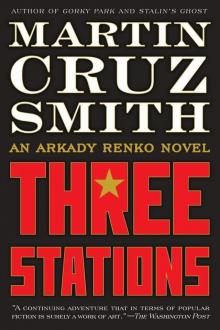 Three Stations
Three Stations Wolves Eat Dogs
Wolves Eat Dogs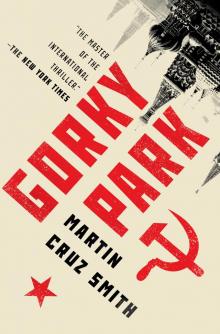 Gorky Park
Gorky Park December 6
December 6 Havana Bay
Havana Bay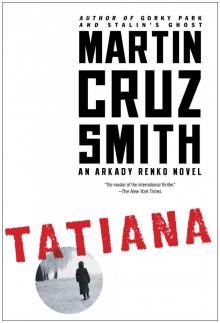 Tatiana
Tatiana The Girl From Venice
The Girl From Venice Stalin's Ghost
Stalin's Ghost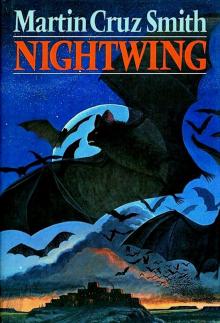 Nightwing
Nightwing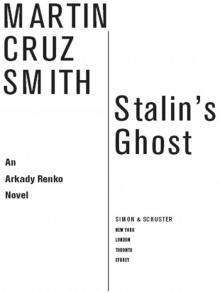 Stalin s Ghost
Stalin s Ghost Gypsy in Amber
Gypsy in Amber Rose
Rose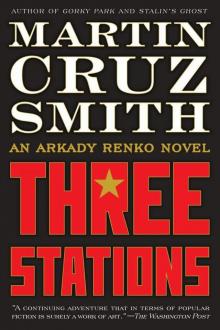 Three Stations: An Arkady Renko Novel
Three Stations: An Arkady Renko Novel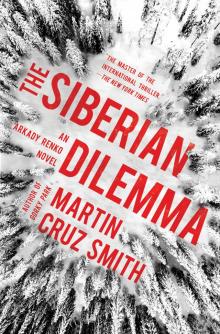 The Siberian Dilemma
The Siberian Dilemma December 6 (V5.0)
December 6 (V5.0)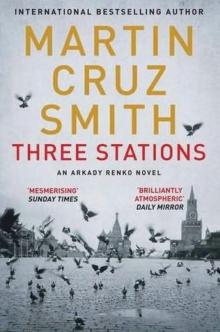 Three Stations ar-7
Three Stations ar-7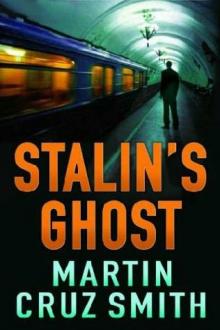 Stalin’s Ghost ar-6
Stalin’s Ghost ar-6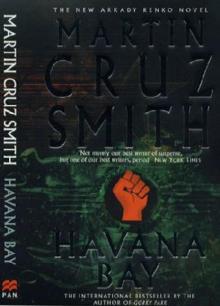 Havana Bay ar-4
Havana Bay ar-4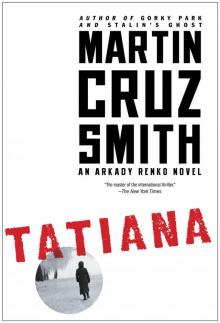 Tatiana ar-8
Tatiana ar-8